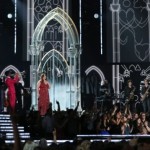Music at Mars Hill is a weekly column by Luke Larsen that seeks to find God amidst the newest trends in both mainstream music and independent music.
I had planned a different topic for my column this week, but when I stumbled upon an Elsewhere post here on CaPC from Professor James Smith of Calvin College, I felt it was necessary to respond in some fashion. The post is titled “An Open Letter To Praise Bands” and was featured on Gospel Coalition. It lays out three criticisms about modern worship music. You see a lot of this online, but this one in particular caught my attention.
First of all, it was incredibly kind and sincere about its criticisms — even taking some of the blame upon the congregation itself for “encouraging” worship leading practices that are unhealthy for the Church. This is the kind of discussion I love to see online. Second, it pays special attention to the actual music going on in our churches on Sunday mornings and takes it seriously — hopefully realizing that the style and music itself is just as important as the words in worship songs.
However, I also found myself disagreeing with Smith on just about every point he makes. Here are the three arguments he makes in the article and my responses to each:
1. If we, the congregation, can’t hear ourselves, it’s not worship.
I don’t know where Professor Smith is going with this one. Trying to define what makes something “worship” in terms of anything but the posture of your heart toward God is stepping on some dangerous ground as far as I’m concerned. In college, I got the opportunity to lead a very passionate college group in worship each week. We played big and we played loud and let me tell you: Our congregation sang even louder. As a worship leader, there was nothing more humbling and special than being able to hear your congregation singing at the top of their lungs to God — there is indeed something very powerful about hearing people sing together in unison. However, to say that playing music loudly is somehow keeping congregations everywhere from worshipping God is going too far. I can’t tell you how many times I’ve talked to people my age about how difficult it is to freely worship in a setting where everyone around them can hear and see them singing and expressing themselves to God.
2. If we, the congregation, can’t sing along, it’s not worship.
Again, Professor Smith is attempting to categorize what is and isn’t worship rather than trying to work through what is useful and helpful in worship services. I understand what he means by this: Songs should be easy to pick up and accessible to the people in your church. I wholeheartedly agree. However, is it not possible to worship without singing at all? Is it not possible to worship in utter silence?
3. If you, the praise band, are the center of attention, it’s not worship.
I really understand the argument the writer is trying to make here. He’s right in that it isn’t at all about the people on stage. It’s about the Spirit of the Lord speaking through them. In fact, following this line of logic is what made the Church of Christ denomination remove instruments from their worship services. However, his comments about putting worship bands in the back of rooms comes off slightly offensive to me. Not because I like being the center of attention, but because if we are not mature enough to be able to be led by another human being to Jesus and not worship that human being, perhaps we shouldn’t have pastors speaking at churches either. Why not just play a recording and have everyone worship to that?
My point here is that God uses different human beings with all their different skills, brains, and character traits to lead His Church in different ways and to move in His Spirit through. In our local churches we, as the congregation, should be thinking deeply about the music we play in worship to God because it really does matter. It really does influence how we think about God and how we interact with Him. The important thing to remember is that this will end up looking different in every congregation and every culture.
Editor: Here’s a related column on contemporary worship music: “Citizenship Confusion: Auto-Tuned Elevation Church.”











